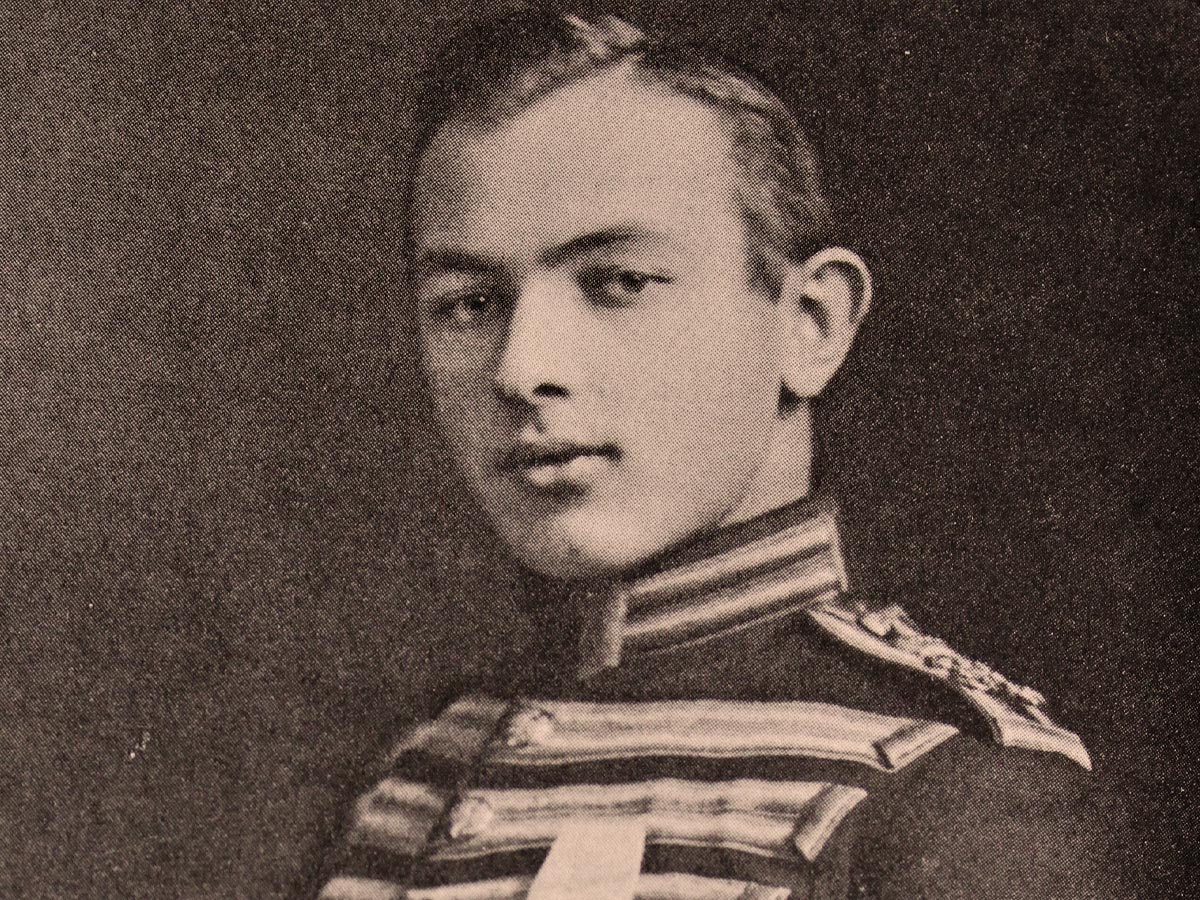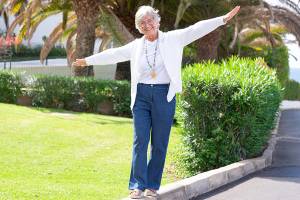By SUZANNE WARING
In 1969 Tanya Cameron’s grandfather, Fyodor Sergeyevich Olferieff, gave her the responsibility of his memoirs when he pointed to a large stack of papers on a shelf in his closet. He said he was too old and tired to pursue the project further, so he entrusted her to do something with them.
This new dimension to her already busy life became a forefront responsibility a few years later after her grandfather died. Since the memoirs were written in Russian, Tanya first had to learn the language.
She had heard Russian as a child and recognized words when her mother, aunt, and grandparents spoke, but she had never actually learned the language.
Russian is a Slavic language with a different alphabet and syntax than English. In 1986 Tanya began the arduous task of learning as much as she could by taking classes, studying with others, working independently, traveling throughout Russia, and studying Russian history.
Once she became comfortable with the language, she started translating the memoir in 1988. Knowing the history of 19th and 20th century gave her a perspective as she translated the memoirs and added a foreword, epilogue, footnotes, and photographs.
It was a 35-year process. Meanwhile, she raised her children in Bozeman, Mont., where her husband was a professor at Montana State University. They later moved to her husband’s family ranch south of Cascade, Mont., where she took on the responsibility of a working ranch’s bookkeeper.
She is now 79 years old, living in Great Falls.
She finished the manuscript in 2016 and sent a three-page summary to the Hoover Institution, located at Stanford University, her alma mater. After reading the summary, affiliated Hoover Institution Russian experts invited her to meet with them when they went over the memoir translation and the additional materials she had written. This led to the Hoover Institution publishing the book of Fyodor’s life.
Fyodor was born into Russian nobility on a large estate in the Tver Province in 1885. His ancestor had been granted a Charter of Nobility by Catherine the Great a century earlier. Fyodor’s mother was also from nobility and held estates in Tver Province, where Fyodor grew up.
Playing with the children of workers on the estate and observing the peasant families’ difficult life gave Fyodor compassion and understanding of the common people and future events of the 1905-07 revolution, the collapse of the imperial state in 1917, and the forthcoming Ukraine civil wars.
Having been educated by tutors on the estate, Fyodor was accepted into an exclusive military academy at the age of 13. There he became a member of Nicholas II’s own regiment, the Life-Guard Horse Grenadiers.
He studied at the Corps of Pages for seven years and graduated second in his class in 1905. For his achievement he was granted the honor of becoming a Kamer Page to the Tsarina for a year. The number-one graduate served the Tsar.
Fyodor was with the Tsarina in January 1905, during the Blessing of the Waters Ceremony, when a bullet came crashing through the window. Though shaken, neither was hurt.
In 1906 Fyodor was commissioned as a Second Lieutenant and began a career as a Russian military officer. His final and most memorable and rewarding peacetime duty was teaching illiterate soldiers to read and write.
In 1911 Fyodor married Mary Vladimirovna Grevens, and they had three children, including Tanya’s mother. Mary encouraged Fyodor to apply to the Imperial War Academy, which he did and was accepted in 1912. He graduated in 1914 on the eve of the First World War.
During World War I, Fyodor saw action. In one battle he replaced the chief of staff who had been killed, and he led the regiment in attack and saved the division. He later became reconnaissance commander, was witness to Russia’s first air battle victory, and flew many reconnaissance missions.
In 1917 he was at General Alekseev’s side when the general received a telegraph message announcing the Tsar’s abdication.
Shortly after, when the Tsar arrived to bid farewell to his troops, Fyodor spoke with him for the last time.
Because Fyodor was considered a “White Russian”—a member of the anti-communist forces that fought the communists, known as the “Reds”—he became an enemy to the Bolsheviks. A friend gave him a passport that identified him as a Red Cross employee. With this passport he escaped to Kiev. He hoped to join the “White Movement” there. After his arrival, he arranged for his family to join him.
In 1918, while they were in Kiev, the memoir tells of the family’s experiences of terror and several narrow escapes from death at the hands of the Bolsheviks. Ironically, it was the German occupation, which established order, that saved them.
They were able to flee to Odessa in 1919, where Fyodor was called to be the French translator to the chief of staff of the allied troops. When the Bolsheviks took control of the city, and no Russians were allowed to leave, the general took pity on Fyodor and his family and issued a passport for them to depart for Constanza, Romania.
They were the last passengers allowed on a Turkestan passenger ship overflowing with Romanian soldiers. They sailed out of the harbor with the sound of guns firing, leaving their homeland forever. Fyodor concluded his memoirs at the point where the family left Odessa; however, Tanya wrote in the epilogue about the remainder of Fyodor’s life.
The family wandered across the globe for a year. They first went to Constanza, then Constantinople, Malta, India, Hong Kong, Nagasaki, Tokyo, Yokohama, Honolulu, and finally San Francisco. Along the way they used the jewels that Mary had sewn into the family’s clothing as monetary means.
On the ship from Honolulu, they had no immigration papers, only a “Declaration of Alien about To Depart for the United States” document issued by the American Consulate General in Yokohama. However, Mary had insisted that they travel first class, which saved them once again because the first-class passengers were allowed to disembark in San Francisco without much scrutiny, but the passengers in tourist and second-class without papers were not permitted to disembark and were sent back to Asia.
A contingency of Russians who had escaped the Bolshevik revolution was located in San Francisco, which gave Fyodor’s family a base. Fyodor became a cartographer and geologist for an oil company, and the family lived in several communities in California. Mary, who was proficient in French, taught in several institutions of higher learning.
Gary M. Hamburg, who edited the memoirs, stated that Fyodor composed the memoirs “to understand himself and to record his broken life for posterity as a privileged observer of a bloody, historically pivotal era.”
Fyodor suffered so much hardship over his life, yet Tanya remembered him as a kind and wonderful man who took her for walks and taught her to play cards. Combining her memories with her research, she said, “This project has broadened my perspective, and I have learned much more about my ancestry.”
Growing up, Tanya had been told family members who remained in Russia were likely to have either been killed or starved to death. When her mother’s sister, Aunt Shura, died, Tanya included Shura’s maiden name in the obituary, which a distant cousin, who was researching his family genealogy, picked up.
He is a doctor and professor of medicine at Moscow State University. Tanya now knows that some family members survived and has the pleasure of communicating via email with this distant cousin who still lives in Russia and writes to her in Russian.
Through Tanya’s demanding and time-consuming study, research, and translating, and with the careful editing by Gary M. Hamburg of the Hoover Institution, Russia in War and Revolution: The Memoirs of Fyodor Sergeyevich Olferieff became a reality in March 2021. This easy-to-read, personal story of history in the making is available through the Hoover Institution, Amazon, and Barnes and Noble. MSN









